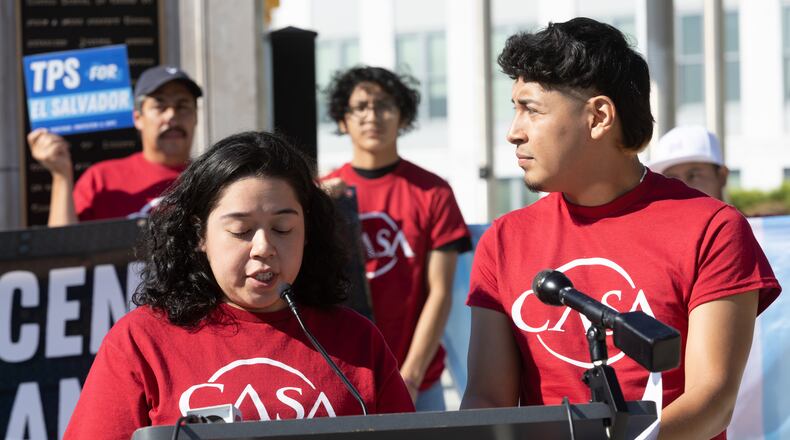Waving their national flags and breaking out into chants of “Ganaremos esta lucha” — Spanish for “We will win this fight” — a group of roughly 30 immigrants and advocates gathered in front of the Georgia Capitol on Thursday morning, where they asked for more humanitarian relief for Central American exiles.
They called for widened relief through the Temporary Protected Status (TPS) program that has historically been granted to immigrants living in the U.S. from countries affected by natural disaster, armed conflict, or other conditions that make it unsafe to return. Among the benefits granted to recipients are work permits and protection from deportation.
Thursday’s rally participants addressed their demands for TPS to one person: President Joe Biden. Unlike more comprehensive immigration reform, which would require congressional action, the executive branch can choose to grant TPS unilaterally.
Since the start of its term in January 2021, the Biden administration has added Venezuela, Afghanistan, Cameroon, Ukraine and Myanmar to the list of countries whose nationals are eligible to apply for TPS. As of October 2021, it was estimated that at least 700,000 immigrants nationwide either had protection or were eligible to receive it, according to the Pew Research Center.
Protesters in Atlanta demanded that Guatemala also be added to the list of TPS-eligible countries, citing recent natural disasters and local impacts of climate change, which is causing widespread food shortages. They also asked for updated TPS designations for El Salvador, Honduras and Nicaragua, to cover more recently arrived immigrants from those nations. As it stands, an immigrant from Nicaragua must have settled in the U.S. in 1998 or earlier to be TPS-eligible.
“These impacted immigrants have fled their countries because of political and climate crises and deserve to be welcomed here with open arms and without having to fear the threat of deportation,” said Stephanie Contreras, immigration manager for CASA, an advocacy group. “We need TPS and we demand it now.”
TPS critics say that recurring extensions are making the program more permanent than it was meant to be, a concern that led President Donald Trump to remove protections for Hondurans and Salvadorans – decisions that were later blocked in court.
“As the name indicates, Temporary Protected Status is not a permanent solution,” acknowledged Andres Parra, a community organizer with the GALEO Impact Fund, an organization representing Latinos in Georgia. “But this is one achievable decision this administration can make to save many lives and […] demonstrate a willingness to stand with our community.”
Nohemy Martinez, 36, said she fled the oppressive regime of Nicaraguan President Daniel Ortega after her brother was kidnapped. She and her husband turned themselves in to immigration authorities at the U.S.-Mexico border in August 2021, and came to the Atlanta area after a stint in detention.
Once a lawyer, Martinez now earns a living cleaning houses. Her husband works in construction. The couple applied for asylum, but they have yet to receive a decision on their case, and they don’t yet have work authorization.
“TPS would give us the opportunity to have a work permit and live here with dignity, and have our work be valued,” she said.
Julian Ramirez, 30, is an unauthorized immigrant who could benefit were a new TPS designation announced for his home country, Guatemala. Since making his way to Gwinnett County roughly a year ago, he has worked as a builder, painter and barber.
“Leaving your country is never an easy decision to take,” he said, speaking with a Guatemalan flag draped on his shoulders.
The sole public official present at Thursday’s rally was Democratic State Rep. Kim Schofield, of Atlanta.
“Undocumented people bring a lot of value to our state and nation,” she said. “There is room here for everyone.”
The timing of Thursday’s rally was doubly significant. September 15 kicks off Hispanic Heritage Month. It also marks the Independence Day for Costa Rica, El Salvador, Guatemala, Honduras and Nicaragua.
The Atlanta Journal-Constitution and Report for America are partnering to add more journalists to cover topics important to our community. Please help us fund this important work at ajc.com/give
About the Author
Keep Reading
The Latest
Featured



